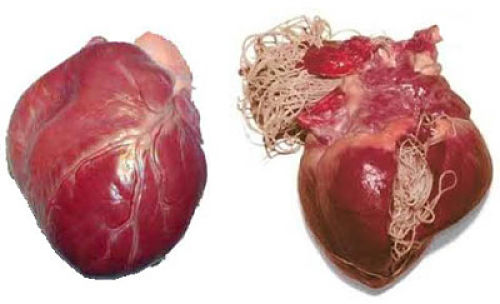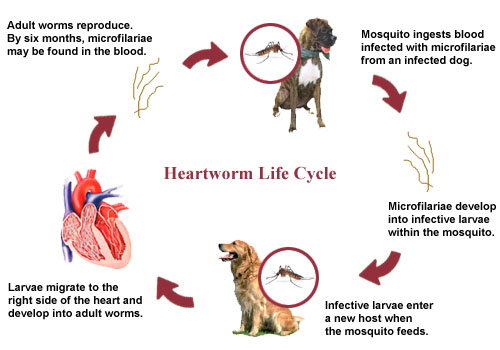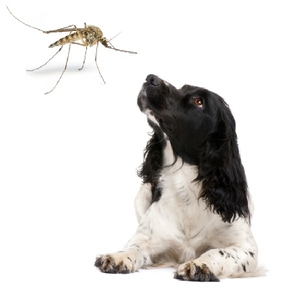Heartworms in Dogs a Debatable Health Risk Dilemma
Canine heartworms are enough to put the fear of God in your own heart. Who wants to think that your dog might have his precious heart full of nasty, life threatening worms. The picture below is enough to make you sick, isn't it? But let's calm down and look at the whole topic reasonably, so we can keep our sanity.
 Healthy heart on the left. Heartworm infested heart on the right.
Healthy heart on the left. Heartworm infested heart on the right.Here are a few need to know facts about heartworms in dogs.
- the National Heartworm Awareness campaign is sponsored by veterinary drug companies
- heartworm ' preventative meds ' are really chemical insecticides with the potenial for serious toxic side effects
- only a small percentage of dogs are actually at risk for a heartworm infestation
- heartworms are becoming resistant to drug ' preventatives '
Heartworm Symptoms in Dogs and Infection Progression
This where it gets difficult, because heartworm symptoms in dogs typically do not show up for a long time, usually at least six months after being infected with the larvae called dirofilaria immitis. During this time the larvae mature into adult worms, mate and then give birth to more little microfilaria.
The mosquito is the required intermediate step here and not all mosquitos carry heartworm. An infected female mosquito must bite an infected dog and then carry the larvae to the next dog it bites. Then the cycle continues. The diagram below explains this very well.

How High Is Your Dog's Risk for Heartworms?
Since heartworm preventative ' meds ' are really toxic, chemical insecticides, it would be wise to weigh your dog's risk for infection. Is the benefit of chemical prevention worth the risk of toxic chemical overload?
Is your dog at risk, and how high is that risk? Much of that risk analysis will depend on where you live. If you live in a high risk area of North America you might want to consider conventional veterinary treatment at low minimum doses. If you live in a low risk area, and your dog is a house pet, do you need to use these chemicals at all?
Here's a good article which will tell you accurately how much risk your dog has, and a heartworm prevalence map for your particular area. The further north, the lower the risk. Canada is considered very low on the risk scale for heartworms.
Here are some questions to ask yourself.
- Do you live in a high risk area?
- How much time does your dog spend outside?
- How thick is your dog's coat ( natural protection )?
- How healthy is your dog ( strong immune function )?
Is Natural Heartworm Treatment Effective?
Although I always advocate natural remedies where possible, in truth, I think it's easier to prevent a heartworm infection, than it is to treat a heartworm infection with natural remedies, after the fact.
That is because the little microfilaria are deposited in the dog's blood by the mosquito. This is different than other types of parasites and parasitic worms which are usually ingested, pass through the digestive tract and enter hatch or break open in the intestinal environment.
Personal Responsibility Is the Best Prevention Solution for Heartworm
I don't want to sound like a pessimist. I just want to be truthful. I very much believe that the best way to minimize your dog's risk and prevent a heartworm infection is by making sure you are...
- using natural products to topically repel mosquitos
- using natural anti pathogenic and antiparasitic herbs to eliminate microfilariae
- using natural products to build overall health, and keep his immune system strong.
- using natural products to help your dog detox insecticide chemicals and toxins from dying microfilariae
If you live in a high risk area make sure to get your dog tested a few times a year.
Here are my suggestions for natural insect repellants including mosquitos. The use of antiparasitic herbal remedies offers natural protection along with additional general health support.
New! Comments
Have your say about what you've just read here. Use the comments box below.
Sharing is appreciated!



